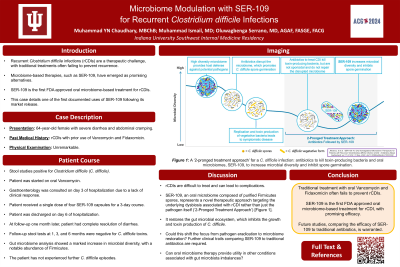Tuesday Poster Session
Category: Colon
P3792 - Efficacy of Microbiome Modulation With SER-109 for Recurrent Clostridium difficile Infection: A Case Report
Tuesday, October 29, 2024
10:30 AM - 4:00 PM ET
Location: Exhibit Hall E

Has Audio

Muhammad YN Chaudhary, MBChB
Indiana University Southwest
Evansville, IN
Presenting Author(s)
Muhammad YN. Chaudhary, MBChB1, Muhammad Ismail, MD2, Oluwagbenga Serrano, MD, FACG3
1Indiana University Southwest, Evansville, IN; 2Indiana University Southwest, Cedar Rapids, IA; 3Good Samaritan Hospital, Vincennes, IN
Introduction: Recurrent Clostridium difficile infection (rCDI) is a significant challenge, with traditional treatments often failing to prevent recurrence. In the past few years, microbiome-based therapies have emerged as promising alternatives. SER-109, an oral microbiome composed of purified Firmicutes spores, received FDA approval in April 2023 as the first oral microbiome-based treatment for rCDI. This case report details one of the first documented uses of SER-109 following its market release, highlighting its novel approach and clinical benefits.
Case Description/Methods: A 64-year-old female with a history of rCDI presented with severe diarrhea and abdominal cramping. Despite multiple courses of vancomycin and fidaxomicin, her infection recurred six times over the past year, significantly impairing her quality of life. Given the refractory nature of her CDI, she was started on SER-109, following its recent FDA approval.
The patient underwent a standard antibiotic treatment regimen followed by a single dose of 4 SER-109 capsules. The treatment dose contained Firmicutes spores, designed to restore her gut microbiome balance. Over the following weeks, there was complete resolution of diarrhea. Follow-up stool tests at 1, 3, and 6 months were negative for C. difficile toxins. Additionally, gut microbiome analysis showed a marked increase in microbial diversity, with a notable abundance of Firmicutes, which are beneficial for gut health. The patient experienced no further CDI episodes.
Discussion: SER-109 represents a novel therapeutic approach targeting the underlying dysbiosis associated with rCDI rather than just the pathogen itself. This case successfully demonstrates microbiome modulation in achieving sustained remission of rCDI. The successful outcome aligns with recent clinical trials showing that SER-109 significantly reduces CDI recurrence rates compared to placebo.
The mechanism of action involves restoring the gut microbial ecosystem, which inhibits the growth and toxin production of C. difficile. The ease of oral administration and favorable safety profile make SER-109 an attractive alternative to traditional antibiotic therapies, which often exacerbate gut dysbiosis.
This case supports the growing evidence that microbiome therapeutics like SER-109 can offer durable solutions for rCDI. Future research should focus on long-term outcomes, optimal dosing regimens, and the potential application of similar therapies for other microbiota-related gastrointestinal disorders.
Disclosures:
Muhammad YN. Chaudhary, MBChB1, Muhammad Ismail, MD2, Oluwagbenga Serrano, MD, FACG3. P3792 - Efficacy of Microbiome Modulation With SER-109 for Recurrent <i>Clostridium difficile</i> Infection: A Case Report, ACG 2024 Annual Scientific Meeting Abstracts. Philadelphia, PA: American College of Gastroenterology.
1Indiana University Southwest, Evansville, IN; 2Indiana University Southwest, Cedar Rapids, IA; 3Good Samaritan Hospital, Vincennes, IN
Introduction: Recurrent Clostridium difficile infection (rCDI) is a significant challenge, with traditional treatments often failing to prevent recurrence. In the past few years, microbiome-based therapies have emerged as promising alternatives. SER-109, an oral microbiome composed of purified Firmicutes spores, received FDA approval in April 2023 as the first oral microbiome-based treatment for rCDI. This case report details one of the first documented uses of SER-109 following its market release, highlighting its novel approach and clinical benefits.
Case Description/Methods: A 64-year-old female with a history of rCDI presented with severe diarrhea and abdominal cramping. Despite multiple courses of vancomycin and fidaxomicin, her infection recurred six times over the past year, significantly impairing her quality of life. Given the refractory nature of her CDI, she was started on SER-109, following its recent FDA approval.
The patient underwent a standard antibiotic treatment regimen followed by a single dose of 4 SER-109 capsules. The treatment dose contained Firmicutes spores, designed to restore her gut microbiome balance. Over the following weeks, there was complete resolution of diarrhea. Follow-up stool tests at 1, 3, and 6 months were negative for C. difficile toxins. Additionally, gut microbiome analysis showed a marked increase in microbial diversity, with a notable abundance of Firmicutes, which are beneficial for gut health. The patient experienced no further CDI episodes.
Discussion: SER-109 represents a novel therapeutic approach targeting the underlying dysbiosis associated with rCDI rather than just the pathogen itself. This case successfully demonstrates microbiome modulation in achieving sustained remission of rCDI. The successful outcome aligns with recent clinical trials showing that SER-109 significantly reduces CDI recurrence rates compared to placebo.
The mechanism of action involves restoring the gut microbial ecosystem, which inhibits the growth and toxin production of C. difficile. The ease of oral administration and favorable safety profile make SER-109 an attractive alternative to traditional antibiotic therapies, which often exacerbate gut dysbiosis.
This case supports the growing evidence that microbiome therapeutics like SER-109 can offer durable solutions for rCDI. Future research should focus on long-term outcomes, optimal dosing regimens, and the potential application of similar therapies for other microbiota-related gastrointestinal disorders.
Disclosures:
Muhammad Chaudhary indicated no relevant financial relationships.
Muhammad Ismail indicated no relevant financial relationships.
Oluwagbenga Serrano: MERCK – Stock-publicly held company(excluding mutual/index funds).
Muhammad YN. Chaudhary, MBChB1, Muhammad Ismail, MD2, Oluwagbenga Serrano, MD, FACG3. P3792 - Efficacy of Microbiome Modulation With SER-109 for Recurrent <i>Clostridium difficile</i> Infection: A Case Report, ACG 2024 Annual Scientific Meeting Abstracts. Philadelphia, PA: American College of Gastroenterology.
